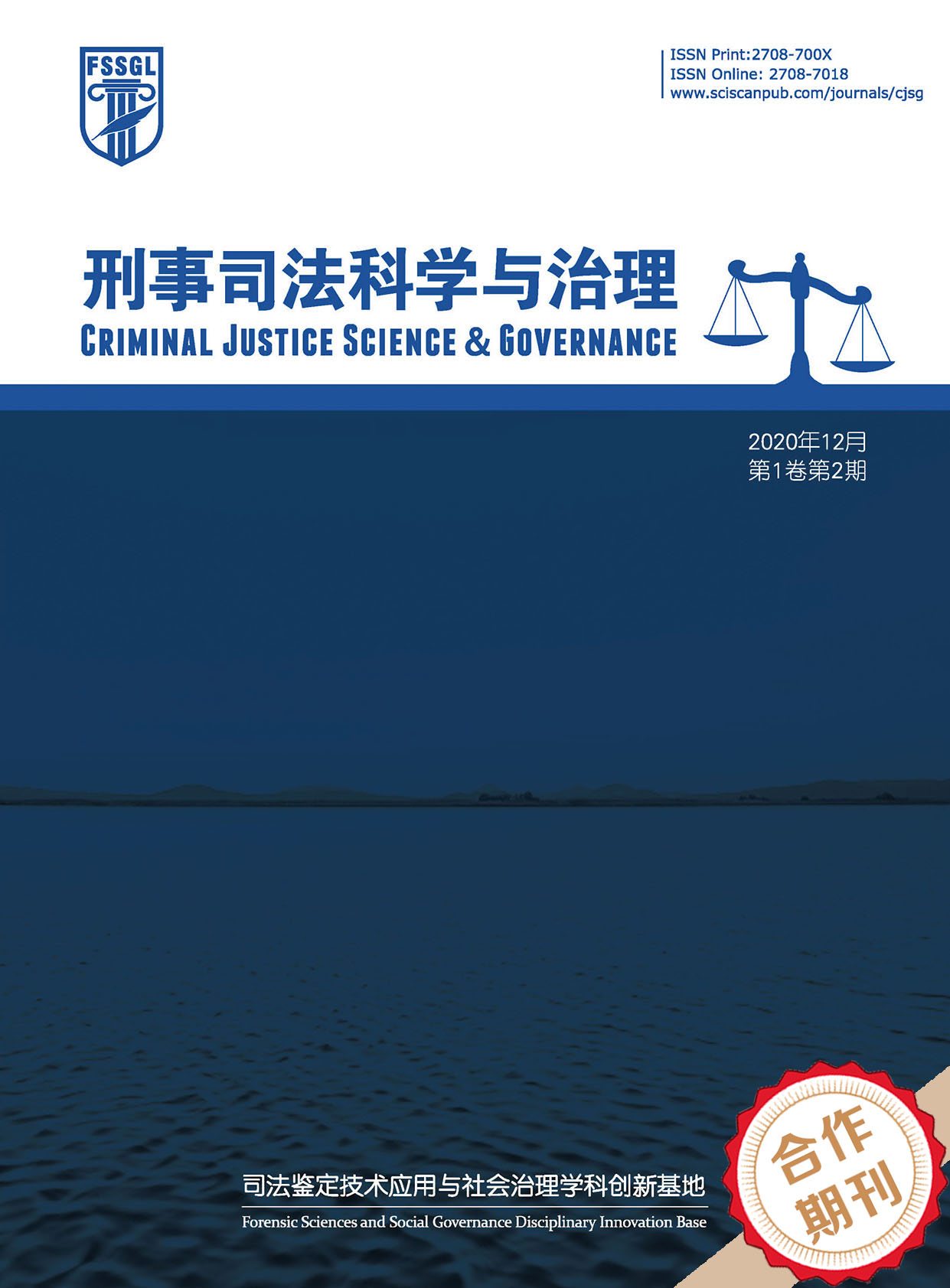Criminal Justice Science & Governance
醉驾型危险驾驶案中鉴定意见存在的问题及其改进措施 ——基于 63 份裁判文书的实证研究
Problems and Improvement Measures of Identifying Opinions in Drunk Driving Hazardous Driving Cases -An Empirical Study Based on 63 Judgment Documents
- Authors: 史玲莉 陈鲜瑜*
-
Information:
西南政法大学,重庆
-
Keywords:
Drunk driving; Dangerous driving crime; Expert opinion醉酒驾驶; 危险驾驶罪; 鉴定意见
- Abstract: In the crime of drunk driving, the expert opinion of blood alcohol content has become the main basis for conviction. In the court interrogation, the driver and his defense attorney have also raised objections to the expert opinion, mainly including the procedure, method, subject and standard of application of the expert opinion, and the judge’s attitude towards the objection is mostly non adoptable or supportable. The main reasons are related to the authority of appraisal bodies and appraisal opinions, the inadequacy of the party’s argument on objections, the dependence of judges on appraisal opinions, and the slow and inadequate ideological transformation. Based on this, we should standardize the procedure of blood sample extraction and identification, strengthen the implementation of applicable norms for identification, standardize the regulation and management of identification institutions and experts, avoid the problem of integration of investigation and identification, and strengthen the transparency of identification procedures, which is conducive to better standardize the identification procedures and enhance the evidentiary capacity of expert opinions. 在醉驾型危险驾驶罪中,血液酒精含量的鉴定意见成为其定罪的主要依据,庭审质证中, 驾驶人员及其辩护律师也多围绕该鉴定意见提出异议,主要包括鉴定程序、鉴定方式、鉴定主体、 鉴定适用标准等方面提出异议,而法官最终对异议的态度也多为不予采纳和支持。究其主要原 因,与鉴定机构及鉴定意见的权威性,及当事人对异议的说理不足;法官对鉴定意见的依赖性, 及意识形态转变的缓慢与不到位等有关。基于此,规范血液样本的提取及鉴定程序,加强鉴定 适用规范的执行;规范对鉴定机构及鉴定人的规范与管理,避免侦鉴一体问题;加强鉴定程序 的公开透明化,有利于更好地规范鉴定程序,增强鉴定意见的证据能力。
- DOI: https://doi.org/10.35534/cjsg.0101006
-
Cite:
史玲莉,陈鲜瑜.醉驾型危险驾驶案中鉴定意见存在的问题及其改进措施——基于 63 份裁判文书的实证研究[J].刑事司法科学与治理,2020,1(1):66-77.
https://doi.org/10.35534/cjsg.0101006
1 引言
鉴定意见作为法定证据之一,对案件事实的认定起到一定的积极作用。如今在实务中涉及需要司法鉴定的案件越来越多,特别是2011年5月1日《刑法修正案(八)》将危险驾驶罪纳入刑法体系中以后,“是否醉酒驾驶”以及其中的“血液酒精含量”就屡屡出现在司法鉴定人员的视野中。醉驾案中血液酒精含量鉴定意见不仅仅是一种认定酒驾或醉驾这一事实的法定证据,更可以称得上是危险驾驶罪成立与否的唯一性、定罪性证据。因此,对于其中血液酒精含量的鉴定程序、鉴定方式、鉴定适用标准,以及最终出具的鉴定报告的证据作用等问题,各界都逐渐予以重视;法官对鉴定争议的处理方式,采纳标准也进一步受到了关注。
目前,学界关于醉酒驾驶中血液酒精含量鉴定意见方面的研究并不多,在中国知网数据库(CNKI)输入“醉酒驾驶中血液酒精含量”“醉酒驾驶”“鉴定意见”“危险驾驶罪”等关键词进行检索、筛选,仅得到不足10篇关于醉酒驾驶中血液酒精含量以及鉴定证据方面的研究,且多是对作为证据的鉴定意见及其特性进行研究。主要包括:刘艳红教授从证据的客观性、合法性入手,以定罪证据的角色对血液酒精含量鉴定意见进行分析;其再在刑事证据规则方面,对呼气酒精测试结果与血液酒精测试结果能否单独作为证据使用,以及作为何种证据使用提出了明确的标准;王志刚博士从血液样本本身所具有的特殊属性出发,对规范我国血液样本采集程序提出了主体、程序等方面的意见,并主张建立检查留置制度以解决血液酒精测试类人身检查程序面临的“期限供给不足”的缺陷;张红霞、张先国等人则对酒后驾车BAC(血液酒精浓度)标准、证据价值及相关的检测程序进行了分析。此外,从检索出结果看,并没有大范围、大规模地对全国内醉酒驾驶中鉴定意见存在的问题进行实证研究,唯一一个对全国范围内2912份醉酒型危险驾驶罪判决书做的实证研究也只是分析了其中影响量刑的因素,包括影响拘役天数、罚金金额、缓刑情况的显著因素。考虑到酒驾入刑已经实施了一段时间,该类案件数量近年也不断增多,本文拟针对醉驾型危险驾驶案中的血液酒精含量鉴定问题进行实证研究,以更好地发现目前该司法鉴定程序中存在问题,进而找到有效的解决方法。
考虑到2011年5月1日《刑法修正案(八)》才正式将酒驾纳入刑法体系中,将其作为危险驾驶罪成立的法定情节之一,因此,本文样本的选取时间也即从2011年5月1日开始,到2018年5月1日结束。具体的检索方式为:在北大法宝司法案例数据库中,采用普通检索模式,选择“案例与裁判文书”,案由选取为“刑事”“危害公共安全罪”“危险驾驶罪”,参照级别为“法宝推荐”,审理程序选择“全部”,文书类型选取为“判决书”,审结日期自定义为“2011.05.01—2018.05.01”,标亮及显示关键词为全文中的“鉴定”,初步获得案例9172件。 由于笔者研究的对象,主要是危险驾驶罪中对被告人血液酒精含量鉴定存在的问题,因此,需要对检索出的9172份判决书进行筛选,即选择被告人或/与辩护律师对鉴定意见有异议的案件。经过逐案阅读,最终获得63份被告人一方对鉴定意见提出异议的刑事判决文书。
2 对样本材料宏观分析
2.1 提出异议的时间
在醉酒驾驶被纳入刑法体系中的最初七年,对鉴定意见提出异议的案件多发生在后面的2016年、2017年。通过对63份样本数据材料中鉴定意见提出异议的案件进行浏览、记录发现:2011年、2012年几乎无异议提出,2013年有2例,2014年与2015年各有9例,2016年则有17例,2017年最多,有22件(a),2018年从1月1日到5月1日已上传到北大法宝中的该类型案件为3例(见下图1)。

图1 2011-2018年对鉴定意见提出异议的案件发生的时间
Figure 1 Time of occurrence of cases challenging expert opinion in 2011-2018
异议案件的出现时间随着醉酒入刑时间的增加而增加,这不仅与酒驾入刑得到重视,以及刑法对酒驾的打击力度有关,也与驾驶人员及其辩护人对自身利益的保护与相关规定的更深入研究有关。
2.2 提出异议的主体
因某些案件涉及到当事人聘请辩护律师的情形,因此对鉴定意见提出异议的主体就不仅限于当事人自己,还可能包括辩护律师(b)。根据对63份判决书样本的分析,于一审中对鉴定意见提出异议的共有27份,占比约43%(c),其中由被告人自己对鉴定意见提出异议的案件占比最高,为40%,剩余一件为由被告人和辩护人一起提出异议的案件;但再通过对被告人自己提出异议的案件判决书全文进行分析发现,其中23份为被告人在案发现场对呼气式酒精检测结果不服或者对血液酒精含量检测结果不服而当场提出的重新鉴定异议,仅为最简单的异议要求,即判决书中仅表述为“被告人申请重新鉴定”,或“被告人对鉴定意见提出异议”,随后则有第二份鉴定报告出现,并未列明具体的异议内容,如案号为“(2015)巢刑初字第00342号”的刘某危险驾驶案刑事判决书,公诉机关指控部分内容就仅表述为“经呼气式酒精检测,被告人刘某血液中乙醇含量为122 mg/100 ml。民警遂将其带至合肥市第八人民医院抽取血样,经安徽全诚司法鉴定中心鉴定,被告人刘某血液中乙醇含量为117.5 mg/100 ml。后被告人刘某申请重新鉴定,经安徽省芜湖市疾病预防控制中心检测,被告人刘某血液中乙醇含量为109 mg/100 ml,属醉酒”,可以看出,由被告人在这一部分提出的异议并无实际的原因说明,也或是笔者所收集到的判决书中并未详细列明导致。除此之外,皆为在二审中,或再审中提出的异议。二审提出异议的有35例,占总样本数的56%,再审中提出的异议则仅有1例,占1%。在35份判决书中,由上诉人自己提出的有12件,辩护律师提出的有14件,两者一同提出的有11件,数量相差不大,且都能在判决书中找寻到详细的、实质的异议理由(见表1)。可以看出,除仅提出重新鉴定的异议外,对鉴定意见提出异议的主体多为在二审程序中的上诉人及其辩护律师,且以对鉴定意见有具体的异议为上诉理由。
表1 2011-2018年对鉴定意见提出异议的主体统计
Table 1 Statistics of subjects who object to appraisal opinions in 2011-2018
|
提出异议的主体 |
案件数量(份) |
占比(%) |
|
被告人 |
25 |
40 |
|
被告人及其辩护人 |
1 |
2 |
|
上诉人 |
12 |
19 |
|
辩护律师 |
14 |
22 |
|
上诉人及其辩护律师 |
11 |
17 |
2.3 提出异议的类型
鉴定报告的出具涉及鉴定方式、鉴定主体、鉴定程序,以及鉴定适用标准的正确使用,因此,对于对鉴定报告提出异议的类型,也同样可划分为此。为方便分析,笔者主要将样本中所存在的异议分为对鉴定主体提出的异议、对鉴定程序提出的异议、对鉴定方法提出的异议,以及对鉴定适用标准提出的异议共四类异议。具体的分类标准如下:鉴定人员、鉴定机构为鉴定主体一类;提取与送检的时间、方式、签字、监督、鉴定及报告的出具时间、告知程序为鉴定程序一类;血样的提取、装存、比对,以及消毒液的使用归为鉴定方式一类;鉴定机构适用的规范则是适用标准一类。但根据前文所述,有23份判决书中仅有“被告人申请重新鉴定”,或“被告人对鉴定意见提出异议”,且依法进行了重新鉴定,并再无异议,更无其他重新鉴定程序等的记载。因此,笔者将这一部分异议另行归类,不计入此部分的四类异议类型,剩余40份判决书则为本文异议的主要类型。
由于当事人提出的异议理由并非只有一项,因此,对于40份判决书中异议的具体分类仍存在重合之处。在该部分案件中,当事人仅以对鉴定程序提出异议的有9例,仅对鉴定方式提出异议的有10例,而以鉴定程序或鉴定方式为由提出异议的各有17例,包括上述9例和10例,鉴定主体违法有1例,鉴定适用标准违法的有3例,其他违法11例,在这之中,有1份判决书对鉴定程序、鉴定方式、鉴定适用标准均提出异议,有1份对鉴定程序和标准提出异议,而有7份判决书对鉴定程序与方式提出异议(见表2)。案号为(2017)粤04刑终342号的欧某某危险驾驶案,其辩护律师提出的辩护理由即为“a如果认定上诉人欧某某有罪,也应以入刑的最低标准80 mg/100 ml来认定血液中酒精含量;b侦查机关在办案过程中存在瑕疵,上诉人欧某某的血液酒精含量检验证据存疑。根据《血样提取登记表》,所用消毒液‘安尔碘’是含醇类消毒液,违反检验血液中酒精含量时不应采用醇类药品对皮肤进行消毒的规定;上诉人欧某某的血液酒精检验报告在抽血后5日作出,违反检验鉴定机构应当在3日内出具检验报告的规定;《血样提取登记表》中的性别、年龄与上诉人欧某某不符,推断是事后补录所致,故提取的血样是否按要求当场登记封装存疑”。该案既对消毒液的使用提出了异议,又对检验鉴定时间提出异议。从数据的分析可以看出,在醉酒驾驶中,当事人对鉴定报告的异议并非只有单纯的一项,仔细看来,存在多重异议并存的现象,多处不规范的存在,为当事人提出异议提供了更有力的证据支持。
表2 2011-2018年对鉴定意见提出异议的类型统计
Table 2 Statistics on types of objections to appraisal opinions from 2011 to 2018
|
1.单一型异议 |
|||||
|
异议类型 |
鉴定程序 |
鉴定方式 |
鉴定主体 |
鉴定适用标准 |
其他 |
|
案件数量(件) |
9 |
10 |
1 |
3 |
11 |
|
2.复合型异议 |
|||||
|
异议类型 |
程序与方式 |
程序与标准 |
程序、方式、标准 |
||
|
案件数量(件) |
6 |
1 |
1 |
||
2.4 法官对异议的态度
进一步分析庭审中法官对异议的态度发现:法官对异议予以采信的共为30例,占总样本数的48%,这看似较为乐观的数据中其实包含了23份仅提出重新鉴定异议且同意并进行重新鉴定的;对于其他类型的异议,法官予以采信的只有7例,分别是:对鉴定程序提出异议的2例,对鉴定方式提出异议的1例,对鉴定程序和方式共同提出异议的2例,对鉴定程序和适用标准共同提出异议的1例,提出其他异议的1例。其余33份判决书中,有27份判决书,法官对异议不予采信;有5份判决书法官对异议部分支持、部分不支持;有1份为确认鉴定程序违法,但并不影响鉴定结果的得出与成立(见图2)。

图2 法官对异议的态度
Figure 2 Judge’s attitude to dissent
综合当事人对鉴定意义提出异议的类型,以及经庭审质证后法官对异议的采取态度,可以初步看出,不论是程序异议,还是方式异议,法官对于异议予以否定的居多,在当事人提出鉴定程序、鉴定方式均有异议的情形下,异议成立的情形依旧较少。
3 对样本材料的微观分析
通过对2011年5月1日—2018年5月1日北大法宝法宝推荐之危险驾驶罪中醉酒驾驶案之判决书的整理与分析,对司法实务中当事人及其辩护人对鉴定意见的看法以及态度有了一定的了解,对相关刑事犯罪案件中侦查取证、质证过程中存在的问题也有了一定的认识。经过前后对9172份判决书的粗略浏览以及对63份所提取的有用样本的仔细分析,笔者发现以下问题:
3.1 对鉴定意见提出异议的案件极少
在最初检索的9172份判决书中,仅有63份判决书的当事人对血液酒精含量的鉴定意见提出异议,该数值占比仅约0.7%(d)。不仅如此,在酒驾刚入刑的前三年,即2011年、2012年、2013年,异议案件几乎为零,随着年份的增长,以及国家对酒驾的严厉打击,因醉酒驾驶而入刑的案件才逐年增多,当事人对鉴定意见予以质疑的情形也才有所增长,但纵观整个醉酒驾驶案件,鉴定意见存在异议的仍为极少数。
3.2 法官对异议的态度多为不予采信
根据规定“交通民警要严格按照《交通警察道路执勤执法工作规范》的要求检查酒后驾驶机动车行为,检查中发现机动车驾驶人有酒后驾驶机动车嫌疑的,立即进行呼气酒精测试,对涉嫌醉酒驾驶机动车、当事人对呼气酒精测试结果有异议,或者拒绝配合呼气酒精测试等方法测试以及涉嫌饮酒后、醉酒驾驶机动车发生交通事故的,应当立即提取血样检验血液酒精含量”(e)。严格来说,只有在法庭审理过程中对对鉴定意见提出异议的案件,才为对本文主要的异议样本,对于醉酒驾驶人员在刚被交巡警查获时、进行呼气式酒精测试后,对此提出的重新鉴定的异议,应属于侦查阶段的异议。因此,在排开侦查阶段的23份异议判决书后,剩余的40份判决书中,法官对异议予以采信的仅为7份,27份则为不予采信。
3.3 鉴定程序、方式为主要异议理由
醉驾案中的血液酒精含量鉴定过程中主要存在的问题包括:血液样本的提取、保存、送检、比对以及监督程序,鉴定的时间、程序、操作程序,鉴定报告的出具、送达、签字程序等,而鉴定主体、鉴定适用标准则可以算作次要问题。在本文所采样本中,涉及程序违法、方式违法的异议案件各有17件,占主要异议案件数的86%,其中具体包括以送检时间和程序违规为由提出异议的有6件,以消毒液中含有酒精,影响鉴定意见准确性为由提出异议的5件,还有血液提取、保存未使用抗凝剂或抗凝管,鉴定意见未及时送达当事人等异议,以及部分鉴定时间、方式存在瑕疵等笼统性异议。
4 对样本材料的原因分析
对于上述问题,笔者认为主要有以下原因:
4.1 鉴定机构及鉴定意见的权威性,及当事人对异议的说理不足
刑事案件中的鉴定意见一般是由侦查机关在案件侦查过程中对需要鉴定的事项经其内部的司法鉴定机构或其他司法鉴定机构进行鉴定而得出的鉴定结果。由于鉴定程序的专业性与封闭性,使得当事人对于鉴定的相关过程并无较全面的了解,加之当事人本身对该专业知识的缺乏,使得其对专门机构作出的鉴定意见更是信多疑少。在63份提出异议的案件中,23份在侦查阶段提出重新鉴定申请的判决书多为当事人自己提出,且判决书记载的也仅为“提出重新鉴定的申请”,并无具体的、专业的异议理由;此外,还有11份判决书,当事人在庭审阶段对鉴定报告提出的异议具体内容也不明,多为“酒精检测报告不能作为定案的根据”“对醉驾的测试结果有异议”“两次乙醇含量检验鉴定均不合法,不能作为证据使用”等较为模糊的异议理由,如案号为(2017)浙05刑终76号的周某某危险驾驶案,上诉人周某某提出的上诉理由即为“其血液中乙醇浓度与酒精呼气测试数值差异大,可能有误为由,请求二审从轻处罚并适用缓刑”,如此简单、模糊的上诉理由,使得法官若想予以支持也无证据支持。
4.2 法官对鉴定意见的依赖性,及意识形态转变的缓慢与不到位
鉴定意见是一种专业性较强、科学性较高的证据,其作为由具有专业知识的鉴定机构以及鉴定人利用专业知识对鉴定对象出具的科学证据,具有其不可替代性与科学性。2012年《刑事诉讼法》修改之前,鉴定意见还被称为“鉴定结论”。“结论”二字使得其在证据体系中的地位不可撼动,几乎只要是鉴定机构作出的鉴定结论,法官无需审查,且一律采纳并作为认定案件事实的依据,形成了一种法官对鉴定意见绝对相信与绝对依赖的情形。但考虑到鉴定意见始终是鉴定人个人对相关事实的认识和判断,是其个人的意见,在以客观性为主的同时仍带有主观性,且其只是证据体系中的一种,需要法庭结合其他证据予以审查判断。因此,2012年《刑事诉讼法》将其修改为“鉴定意见”,核心就是要增强庭审抗辩,强化法庭对鉴定意见的审查、对证据的认定与质证,保障当事人对鉴定意见这一证据提出异议并接受审查的权利。但法条文字的快速更改并未促进法官意识形态的快速转变,其对鉴定意见的依赖性依然存在,使得对当事人提出的异议审查较为懈怠。
4.3 鉴定程序方式的不规范性,及强制性规定实施的缺位性
对于醉酒驾驶中的血液酒精含量鉴定应该具有一套专门的规定,包括具体的鉴定主体、适用标准、消毒液的使用、血液的提取与封装方式、告知与送达程序,以及对于鉴定的监督程序等。从本文的数据分析看来,当事人对鉴定意见的异议主要集中在以上程序问题与方式问题上,同时,对于鉴定的适用标准究竟应该适用SF/ZJD0107001-2010,还是GB19522-2010,更或是GA/T842?仍存在管束不严、规范不明的情况。不仅如此,对于鉴定检验的第一步——消毒液的使用问题,无疑应使用不含乙醇的消毒液,而非安尔碘,但在具体的司法实践中,使用含有乙醇的消毒液对醉酒驾驶人员进行消毒时有发生。还有鉴定报告的出具与送达问题,应严格规范在3日内,但为什么还是存在超时的情形?原因是规定实施与监督的不到位,使得鉴定程序存在着不少问题,影响着鉴定意见的准确性,浪费着司法资源。
5 醉酒驾驶中鉴定问题的改进方案
在具体的司法实践中,程序性问题应该算是司法鉴定中的重要问题。对于鉴定意见,根据《最高人民法院关于适用<中华人民共和国刑事诉讼法>的解释》第八十五条的规定(f),我国对其采取零瑕疵的容忍态度,即只要鉴定意见存在一点瑕疵,该鉴定意见则不得作为认定案件事实的证据使用。这对于真正实施了犯罪行为的当事人来说,无疑是使其逃脱法律追究的有用武器;而鉴定机构及其人员工作的疏忽,在一定程度上也将不利于我国刑事诉讼法惩罚犯罪,保障人权目的的实现。因此,加强鉴定人的专业技术培训,提升其细致工作的态度,完善相关程序工作与技术操作的规范,使鉴定意见更加科学、准确、合理的进入庭审,进入法官与当事人的视野,为更有力的打击犯罪提供证据支持。
5.1 规范血液样本的提取及鉴定程序,加强鉴定适用规范的执行
在醉酒驾驶案件中,血液样本的提取是整个案件的关键环节,因其涉及到驾驶人员体内血液酒精含量是否达到法律规定的80 mg/100 ml这一标准,是否可将其定罪的问题,因此,必须严格规范血液提取程序,并严格适用GA/T842-2009和GA/T1073-2013标准。同时,扩大交警执法记录仪的使用范围,对于血液抽取时的情形进行录音录像记录,并保证其完整性与真实性,规范取证行为。具体来说,可参照下列意见执行:
(1)血液提取工作应交由司法机构认定的相关医疗机构,以及有医学资质医务人员来提取,不得随意在就近小医院或小诊所进行血液提取,即使有执法记录仪记录,也不得到未经认定的小医院与小诊所提取,否则,可视为提取主体的不合法,影响后续的鉴定样本准确性。
(2)血液提取过程应有至少一名见证人在场,在确实不能找到见证人的情况下,侦查机关应全程同步录音录像,并说明情况,且经当事人书面签字确认,以保证所提取血液为醉酒驾驶人员本人的血液。
(3)严格规范消毒液的使用,对含有乙醇等酒精成分的消毒液一律不得使用,当事人当场对消毒液有异议的,应当场告知其消毒液名称及成分;对于使用含有乙醇的消毒液提取血液的,该血液一律不得作为鉴定样本使用。
(4)提取血液后必须使用抗凝管或添加抗凝剂的试管当场封装,保存程序一一明示,再由当事人签字确认,后续送检程序也应及时告知当事人,以保证其知情权。
(5)提取血液应提取2份,1份送检,1份存库,送检的血液样本应在1日内移送司法鉴定机构并进行鉴定,特殊情况最长不超过2日,鉴定报告应在3日内出具,以保证血液的新鲜度以及提高案件的侦查效率,这也是血液本身的特殊性使然。存库的血液样本应严格保存与侦查机关物证报告储物冰柜,保存至案件判决宣判并执行结束时,方可丢弃。
5.2 规范对鉴定机构及鉴定人的规范与管理,避免侦鉴一体
鉴于我国目前对四大类鉴定机构仍然实行的是备案登记制的形式化管理模式,对于其他鉴定机构的市场准入门槛也相对较低,我国鉴定机构仍存在着数量多、管理乱、技术低等问题。同时,看似国家对鉴定机构的管理已经由公检法司内部管理转移到司法行政机关的管理,但侦查机关自侦自鉴的情形依然未被取缔。因此,在严格执行强制性鉴定适用标准的同时,应避免侦查机关内部自侦自鉴情形的存在,侦查机关不得既是侦查人员又是鉴定人员,对于同一案件,即使时间紧、任务重、鉴定资源暂时短缺,也不得在本侦查机关进行相应的鉴定。在无法保证侦查机关与鉴定机构绝对独立的情况下,也应保证非侦查机关对本案的鉴定。
5.3 加强鉴定程序的公开透明化
对每一案件的具体鉴定过程,应设立专门的独立档案,且全程录像记录,并最终随同鉴定报告一起封装入档,以保证在当事人有异议之时法官及时审查。对于确有程序违法的情形,则应严格按《中华人民共和国刑事诉讼法》第一百九十二条第三款执行(g)。对鉴定过程、鉴定方式,已经鉴定工作的前置性工作之血液提取等过程,若存在不合法的地方,不得对醉酒驾驶人员予以定罪量刑,鉴定报告有瑕疵,不能作为定罪证据使用的,对被告人一律宣告无罪。因此,对鉴定过程的全程记录,不仅方便法官对异议以及鉴定过程的审查,也有利于对鉴定程序的第三方监督,减少庭审中因当事人提出异议而导致的庭审中断,以及诉讼时限的拖延;在成功实现第三方中立机关监督的同时,提高了诉讼效率,缩短了诉讼时间,加速了案件的审结;同时,在“重证据”的司法改革背景下,能更好的实现打击犯罪与保障人权的完美结合。
6 结语
本文通过对2011年5月1日至2018年5月1日醉酒驾驶案件中对鉴定意见有异议的案件进行实证研究分析,发现了一些在侦查取证、司法鉴定以及相关司法工作人员思维方式等方面的问题。虽然此次实证研究在选取案例时并不全面,在案件发生地的选取上不够严谨,仅是对全国范围内的有代表性的案件进行了研究,但通过对北大法宝之法宝推荐9172份刑事判决书的浏览筛选,以及最终对63份有用文书的精读与分析,仍能得出一些实质性的结论,发现司法实践中存在的问题,对于司法鉴定中存在的不规范,也提出了笔者自己的意见。
参考文献
[1] 刘艳红.醉驾犯罪血液酒精含量鉴定证据客观性与合法性之判断[J].法学论坛,2014(5):3-6.
[2] 刘艳红.醉驾型危险驾驶罪刑事证据规则研究——基于刑事一体化的尝试性构建[J].法律科学(西北政法大学学报),2014(2).
[3] 王志刚.论血液样本证据的特性及其采集司法程序的完善[J].政治与法律,2012(3):2-5.
[4] 张红霞,张先国,邓振华,等.我国酒后驾车BAC标准及检测程序等问题的探讨[J].中国司法鉴定,2004(2):1.
[5] 文姬.醉酒型危险驾驶罪量刑影响因素实证研究[J].法学研究,2016(1):1.
[6] 陈如超.论司法鉴定管理与使用的衔接机制[J].证据科学,2018(3).
[7] 陈如超.司法鉴定管理体制改革的方向与逻辑[J].法学研究,2016(1).
(a) 案号为“(2018)川01刑终65号”的余某危险驾驶案其在2017年的一审中对鉴定意见提出重新鉴定的异议,且对乙醇浓度检验报告有异议;在2018年的二审中再次对一审中未得到支持的乙醇浓度检测报告提出异议。为方便数据分析,笔者将该案列入2017年提出异议的案件之中,特此说明。
(b) 由于在不同的审理阶段对当事人的称谓不同,因此笔者在本文的写作中也严格区分了不同审级当事人的称谓,一审为被告人,二审为上诉人;且为了更清晰的了解提出异议的主体,笔者在此特将辩护人的称谓在一审与二审中作出区分,一审称为辩护人,二审称为辩护律师。此区分仅为笔者此次写作方便之区分,不代表其他。
(c) 特此说明:如无特殊情况,全文数值保留整数。
(d) 由于所获取有用样本数量较少,经计算无法达到1%,因此此处数值保留小数点后一位,与前文第二部分“数值保留整数”相区别,特此说明。
(e) 《公安部关于公安机关办理醉酒驾驶机动车犯罪案件的指导意见》第1条。
(f) 最高人民法院关于适用《中华人民共和国刑事诉讼法》的解释第八十五条“鉴定意见具有下列情形之一的,不得作为定案的根据:(一)鉴定机构不具备法定资质,或者鉴定事项超出该鉴定机构业务范围、技术条件的;(二)鉴定人不具备法定资质,不具有相关专业技术或者职称,或者违反回避规定的;(三)送检材料、样本来源不明,或者因污染不具备鉴定条件的;(四)鉴定对象与送检材料、样本不一致的;(五)鉴定程序违反规定的;(六)鉴定过程和方法不符合相关专业的规范要求的;(七)鉴定文书缺少签名、盖章的; (八)鉴定意见与案件待证事实没有关联的;(九)违反有关规定的其他情形”。
(g) 《中华人民共和国刑事诉讼法》第一百九二条第三款规定“公诉人、当事人或者辩护人、诉讼代理人对鉴定意见有异议,人民法院认为鉴定人有必要出庭的,鉴定人应当出庭作证。经人民法院通知,鉴定人拒不出庭作证的,鉴定意见不得作为定案的根据”。
















